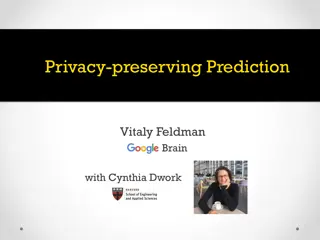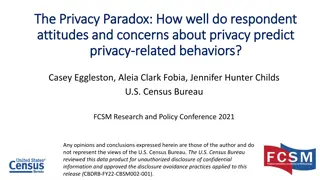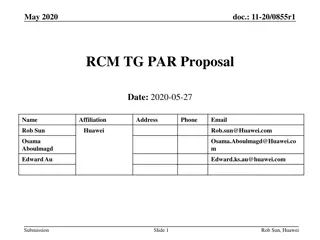Unveiling the Realities of Privacy in App Usage
Exploring the complexities of privacy policies, the disclosure of user data by apps, and the implications of mobile tracking. Learn how AppCensus assists parents in understanding app data collection practices and the risks associated with sharing persistent identifiers. Discover how third parties utilize collected data to build detailed user profiles based on device identifiers.
Download Presentation

Please find below an Image/Link to download the presentation.
The content on the website is provided AS IS for your information and personal use only. It may not be sold, licensed, or shared on other websites without obtaining consent from the author.If you encounter any issues during the download, it is possible that the publisher has removed the file from their server.
You are allowed to download the files provided on this website for personal or commercial use, subject to the condition that they are used lawfully. All files are the property of their respective owners.
The content on the website is provided AS IS for your information and personal use only. It may not be sold, licensed, or shared on other websites without obtaining consent from the author.
E N D
Presentation Transcript
privacy policies often hard to read due to complex language ambiguous by design: we may data collected could include we do not share data with anyone beyond our affiliates* * affiliates is defined to mean anyone with whom we share data.
privacy policies assume: an average reading rate of 250 words/minute the median policy has 2500 words an average of 100 unique websites visited/month 200 hours/year reading privacy policies A. McDonald and L.F. Cranor. The Cost of Reading Privacy Policies. In I/S: A Journal of Law and Policy for the Information Society, 2008.
Apps are able to request access to private user data and sensitive device resources. In their app store listings (such as this one from the Google Play Store), apps disclose their capabilities. However, these disclosures don t tell the full story. Do apps actually use these privileges? With whom do they share sensitive data?
AppCensus helps parents with privacy by showing them what data various apps collect and with whom they share it.
Every device has several persistent identifiers that can be accessed by third- party apps. My serial number is 4769375893 A persistent identifier is a globally unique number. My WiFi MAC address is 4f:55:aa:a8:c3:37 My IMEI is 395827508873822
App developers get paid to share these identifiers with data brokers and advertising companies: Serial number 4769375893 is playing Angry Birds ACME Advertising We now know that user with device serial number 4769375893 plays Angry Birds.
Using data received over time, third parties can use this data to build user profiles. Serial number 4769375893 is playing Angry Birds Serial number 4769375893 is using Twitter ACME Advertising Serial number 4769375893 is playing Speed Car Racing
Using data received over time, third parties can use this data to build user profiles. I know that serial number 4769375893 uses Twitter, and plays Angry Birds and Speed Car Racing ACME Advertising
Using these persistent identifiers, companies can augment user profiles with data from other sources. Data Broker 1 Does anyone know anything about either serial number 4769375893 or IP address 192.168.1.121? IP address 192.168.1.121 is located at 90 7th Street, San Francisco, CA, and has visited the following websites: www.mikesbikes.com www.lipitor.com ACME Advertising Serial number 4769375893 corresponds to IMEI 395827508873822 Data Broker 2
This allows them to build more detailed user profiles. I now know that serial number 4769375893 has IP address 192.168.1.121, IMEI 395827508873822, is located at 90 7th Street, San Francisco, CA, uses Twitter, plays Angry Birds and Speed Car Racing, may be looking to purchase a bicycle, and has high cholesterol. ACME Advertising
Both major mobile platforms (iOS and Android) introduced a user- resettable ad ID to prevent this sort of long-term tracking.
As of 2013, app developers on both iOS and Android are required to use this identifier in lieu of other persistent identifiers. Android Ad ID 3efadc3c-48f8- bfd7-9903f3f84cc2 is playing Angry Birds ACME Advertising
This privacy-protective feature is undermined if additional persistent identifiers are transmitted. Android Ad ID 48ae48bc- 09ff-83e3-37592feb4c8a with IMEI 395827508873822 is playing Angry Birds We have no profile for that AAID, but we do have a profile for IMEI 395827508873822 ACME Advertising
automatic behavior detection what data goes to which parties? is location data collected? what persistent identifiers are collected? are they shared across apps?
The AppCensus system observes when apps access and share personal information, as well as unique persistent identifiers that can be used to track users over time and across services. PERSONAL INFORMATION PERSISTENT IDENTIFIERS Owner Email Address Hardware Serial Number Phone Number IMEI GPS Latitude/Longitude Wi-Fi MAC Wi-Fi Router BSSID (MAC) Android ID Wi-Fi Router SSID (Name) SIM Card ID Google Services Framework (GSF) ID Android Advertising ID (AAID)
57% of Designed for Families apps are in potential violation POTENTIAL VIOLATION RATE (n=5,855) Personal information 4.8% Non-resettable identifiers 39% Potentially non-compliant services 19% Failure to take security measures 40% Note that some apps were observed engaging in more than one of these behaviours, so the percentages will add up to more than 57%.
potential violations often arise from third-party services included with apps These services allow developers to expedite production by offering drop-in functionality (eg. graphics, communications, advertising, or analytics)
potential violations persist due to platform providers not enforcing their own terms
Behavioural advertising uses persistent identifiers to build profiles of users by tracking individuals over time and across services. Google has recognised the privacy implications of persistent identifiers, and in 2014 introduced the resettable Android Advertising ID (AAID) to give users (or parents) control over how advertisers track them. Google requires developers and advertisers to use this in lieu of non-resettable device identifiers like the IMEI and Wi-Fi MAC address.
75% of apps transmitting the ad ID do so alongside other persistent identifiers. this negates the privacy-preserving behaviors of the ad ID (and violates Google s terms).
19% share identifiers or personal information with services not allowed in children s apps
In September 2018, the New Mexico Attorney General filed a suit, with Tiny Lab Productions and Google as co-defendants for violating children s privacy law. https://www.nytimes.com/interactive/2018/09/12/technology/kids-apps-data-privacy-google-twitter.html After facing scrutiny from the New York Times and the New Mexico AG s office, Google recently took a more aggressive stance towards Tiny Labs, taking down their apps after Tiny Labs failed to address the various privacy issues we identified in those products.
These slides were selected by ACCM from the following presentation: Won t Somebody Think of the Children?! Examining Privacy Behaviors of Mobile Apps at Scale Serge Egelman egelman@cs.berkeley.edu @v0max Source: https://d1oclgbf4bbu9h.cloudfront.net/wp-content/uploads/2018/12/Copy-of-Egelman.























